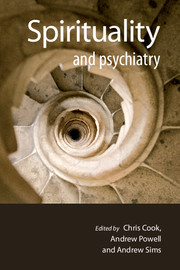Book contents
- Frontmatter
- Contents
- List of contributors
- List of tables, boxes and figures
- Foreword
- Preface
- The Spirituality and Psychiatry Special Interest Group of the Royal College of Psychiatrists
- 1 Spirituality in psychiatry
- 2 Assessing spiritual needs
- 3 Psychosis
- 4 Suicide
- 5 Child and adolescent psychiatry
- 6 Psychotherapy
- 7 Intellectual disability
- 8 Substance misuse
- 9 Neuroscience of the spirit
- 10 Spiritual care in the NHS
- 11 The transpersonal perspective
- 12 Religion and religious experiences
- 13 Pathological spirituality
- 14 Ageing
- Index
7 - Intellectual disability
Published online by Cambridge University Press: 02 January 2018
- Frontmatter
- Contents
- List of contributors
- List of tables, boxes and figures
- Foreword
- Preface
- The Spirituality and Psychiatry Special Interest Group of the Royal College of Psychiatrists
- 1 Spirituality in psychiatry
- 2 Assessing spiritual needs
- 3 Psychosis
- 4 Suicide
- 5 Child and adolescent psychiatry
- 6 Psychotherapy
- 7 Intellectual disability
- 8 Substance misuse
- 9 Neuroscience of the spirit
- 10 Spiritual care in the NHS
- 11 The transpersonal perspective
- 12 Religion and religious experiences
- 13 Pathological spirituality
- 14 Ageing
- Index
Summary
Spirituality is a deeply personal experience that does not depend on being religious or belonging to a faith group. The spirit is the essence of life. This book considers that spirituality is a universal dimension of human experience, being of fundamental or ultimate importance (Cook, 2004). Spirituality is about wholeness and wholesomeness, interconnection and validation; it shows that all lives have purpose and are positively influencing other lives. Each human life matters – there are no exceptions and there is no hierarchy.
Swinton (1999) defines spirituality as that aspect of human existence that gives it its ‘humanness’. To deny that people with intellectual disabilities are spiritual is devaluing their human dignity, for every human being has need to find a sense of meaning of life, a purpose and to feel he or she belongs. ‘The desire for wholeness of being is not an intellectual attainment, for it is no less present in people with learning disability, but lies in the essence of what it means to be human’ (Royal College of Psychiatrists, 2006: pp. 2–3). Hebrew Scripture declares that ‘all are fearfully and wonderfully made’ (Psalm 139, verse 14). Thus, every human life is uniquely valuable, independent of another's perception of their ‘fitness for purpose’. Each person possesses unique gifts and talents that were meant to be shared; however, it first has to be recognised that all people possess such gifts.
Beliefs about disability across cultures and ages
All human societies hold beliefs, practices and rituals for the expression of spirituality. Different spiritual belief systems ascribe different meanings to disability. Some cultures hold that people with disability are of ‘lesser value’, considered ‘undesirable’ or even feared and different cultures deal with these attitudes and feelings in various ways. Some give spiritual explanations for disability that allow control to rest with a superior being, whereas others attempt to find a human understanding of the lives of people with a disability. Some would argue that scriptural bases of religious beliefs form the foundation for the age-old practice of exclusion that people with intellectual disabilities experience in many facets of life. Such attitudes towards disability can result in people internalising negative messages about spirituality and its usefulness.
- Type
- Chapter
- Information
- Spirituality and Psychiatry , pp. 122 - 138Publisher: Royal College of PsychiatristsPrint publication year: 2009

